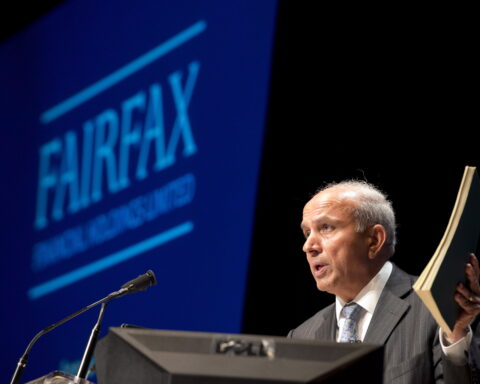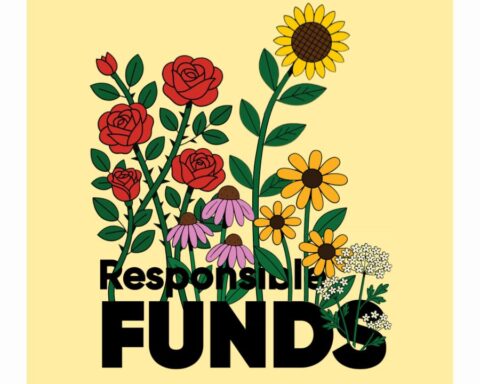Did you ever pass a construction site where you saw several big guys leaning on their shovels watching a little guy dig a hole? That’s been our experience filing shareholder proposals with Canadian oil and gas companies while large investors sit on the sidelines.
Let’s name the elephant in the room: Bay Street and Calgary are on a collision course on net-zero. Large Canadian banks, insurance companies and pensions have declared they will reach net-zero in financed emissions in their portfolios by 2050. Fearing loss of investment, Canada’s major oil and gas companies declared that they too are committed to net-zero. But, any rudimentary analysis shows that simply isn’t true.
The reaction of major Canadian oil and gas companies to new federal anti-greenwashing rules has been telling. They not only complained loudly, but took the unprecedented step of removing many of their corporate climate disclosures from their websites, unlike any other industry in the country subject to the same rules. They say that it’s the uncertainty of the standards that’s causing them to react this way, but it’s basic math that exposes their doublespeak.
The companies’ shorter-term climate targets have never added up to their reaching net-zero by 2050. They game the numbers, like Suncor failing to provide a baseline for its 2030 target so we don’t know what level it’s reducing from, or like Enbridge expressing its targets in “intensity” terms – emissions per unit of production – as opposed to absolute terms, so that they can continue to expand fossil fuel operations, thereby making the climate crisis worse.
The industry has proposed carbon capture and storage as the solution, but only if taxpayers foot the bill while it continues to make billions. Scaling the technology poses massive challenges and has underperformed nearly everywhere else in the world. And the kicker is that even if it works perfectly, it will address only a fraction of the emissions and not touch the much larger “downstream” emissions that show up in the net-zero accounting of financial institutions.
Over the past few years we’ve filed shareholder proposals at companies like Enbridge, Suncor and Cenovus to expose the risks that their failure to transition pose to investors in those companies, which includes most large Bay Street actors like RBC Global Asset Management and TD Asset Management, which act on behalf of millions of Canadians.
Nearly all of these major investors say that they are “engaging” with high-carbon investees in their portfolios in order to advance net-zero, setting this up as a binary choice against divestment. Some of them voted for our proposals, the bare minimum to live up to their commitments. Some didn’t, calling into question their seriousness.
But, with a few exceptions like BCI, we’ve yet to see any large Canadian investors take meaningful steps to themselves press oil and gas companies on net-zero. Some support Climate Engagement Canada, whose assessments show the industry to be off course, but there is little evidence they are acting on that information in ways that will remedy the situation.
Our U.K. colleagues have an expression for this style of weak engagement: they call it “tea and biscuits,” equivalent to having a nice quiet chat with the target company with no results. It’s contrasted with adopting an escalation strategy, where investors use their clout by going public with concerns, filing their own shareholder proposals, holding directors accountable and ultimately divesting if a company fails to transition. In this way, engagement and divestment are not binary choices but complementary steps along a continuum, designed to be effective.
Legal and General Investment Management (LGIM) is a good example of this more robust approach. With about CDN $2 trillion in assets under management, LGIM publishes its climate expectations for investees, follows up with letters and meetings, exercises its voting rights by both filing shareholder proposals and voting against directors, and ultimately puts recalcitrant companies in its divestment list.
This is the kind of approach we need from major Canadian investors like the asset management arms of our big banks, insurance companies (like Manulife and Sun Life) and the “Maple Eight” pensions. The more of them that do this, the more that heavy emitters in Canada will need to change course.
We decided that our oil and gas work was providing these investors with an excuse to not do their own. As long as “somebody else” was stepping up, they could stay on the sidelines. The result is that our oil and gas companies continue to go in the opposite direction to net-zero.
So we quit. Kind of. We’ll stop filing proposals with oil and gas companies but will continue to track whether investors are living up to their climate commitments, including their promises to transform their high-carbon investees. A secure economy, and a decent return on investment, depends on it.
Matt Price is executive director of Investors for Paris Compliance, a shareholder advocacy organization holding Canadian companies accountable to their net-zero commitments.







